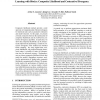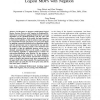509 search results - page 38 / 102 » Compositional Models for Reinforcement Learning |
111
click to vote
ICML
2006
IEEE
16 years 3 months ago
2006
IEEE
How should a reinforcement learning agent act if its sole purpose is to efficiently learn an optimal policy for later use? In other words, how should it explore, to be able to exp...
124
Voted
GECCO
2006
Springer
15 years 6 months ago
2006
Springer
Two mathematical and two computational theories from the field of human and animal learning are combined to produce a more general theory of adaptive behavior. The cornerstone of ...
123
Voted
JMLR
2010
14 years 9 months ago
2010
Composite likelihood methods provide a wide spectrum of computationally efficient techniques for statistical tasks such as parameter estimation and model selection. In this paper,...
136
click to vote
ATAL
2004
Springer
15 years 8 months ago
2004
Springer
Multi-agent research often borrows from biology, where remarkable examples of collective intelligence may be found. One interesting example is ant colonies’ use of pheromones as...
128
click to vote
JCP
2008
15 years 2 months ago
2008
In this paper, we propose a model named Logical Markov Decision Processes with Negation for Relational Reinforcement Learning for applying Reinforcement Learning algorithms on the ...


